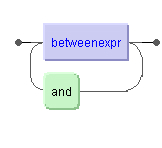Check if one or more Boolean operands are all true.

If all of the operands evaluate to the Boolean value "true", then "true" is returned, otherwise "false".
The operator name must be specified using lower case.
It corresponds to the expression AndExpr defined in XPath,
Section 3.4, Rule
22, but is extended by BetweenExpr. This allows
SequenceExpr and
ProximityExpr to be used
as operands in an AndExpr.
Select all patients born in 1950 and living in Bradford (all
patient nodes that satisfy the following predicate expression:
there is an immediate child node born whose numeric value equals
1950 and there is also a descendant child node city whose string
value equals "Bradford"):
/patient[born = 1950 and .//city = 'Bradford']
Select all patients born in 1950 having a phone number:
/patient[born = 1950 and (address/* after postcode)[position() != last()]]
This query demonstrates that you can use a filtered
SequenceExpr inside an
AndExpr. It effectively selects all patient nodes for
which all the following conditions must be met:
it has a child element node born whose numeric value
equals 1950
it has a child element node address
the address node has at least three child element nodes
that must satisfy these conditions:
one of these child nodes has the name postcode
a sibling node of postcode must exist whose position
is not the last
There are six possible child nodes for address which in
document order are street, housenumber,
city, postcode, country, and
phone. Because of the second predicate expression there must be at
least two nodes following a postcode node, but if this is true,
then it can only be a phone node.
Naturally you can write such a condition much more simply:
/patient[born = 1950 and address/phone]
This query is somewhat faster, since Tamino does not have to expand
address/* (a NameTest) and there is no need to call
two functions used in the nested predicate expression. The second condition is
evaluated to "true" if an element node
phone exists that is a child element of address which
in turn is a child element of a patient node.
BetweenExpr |